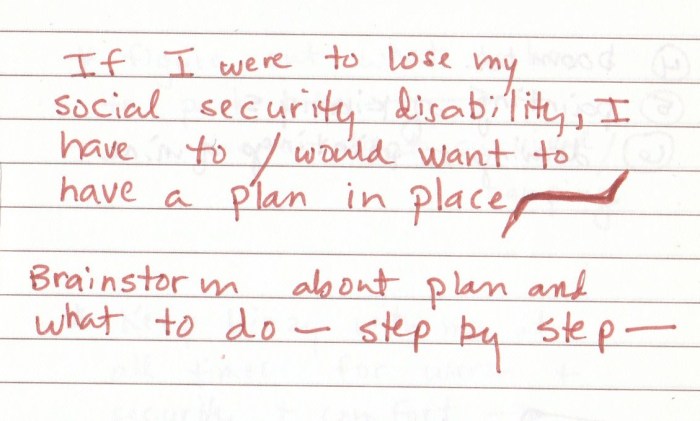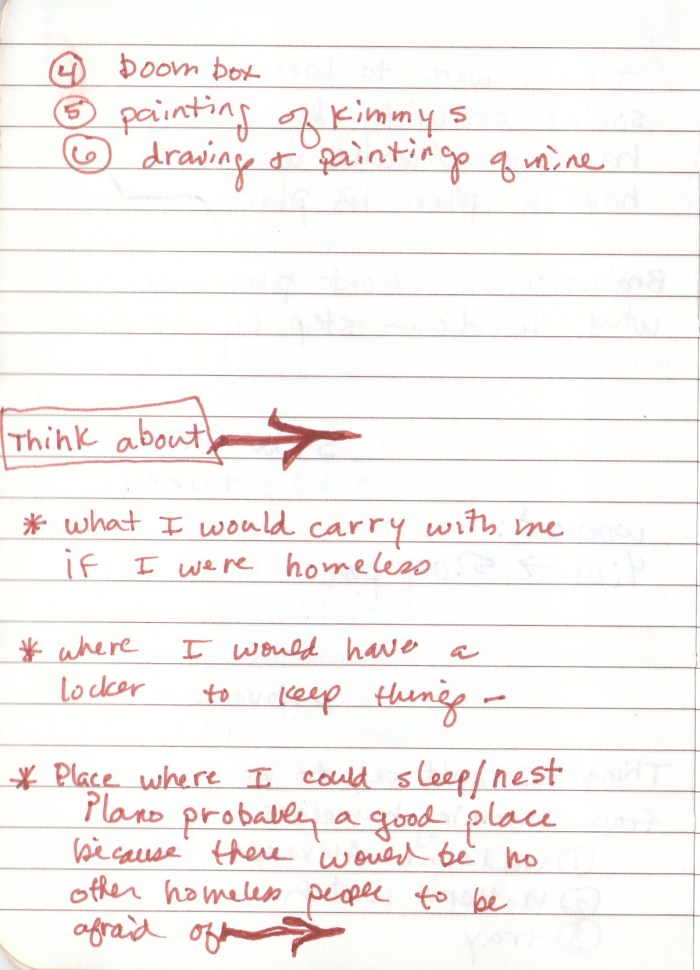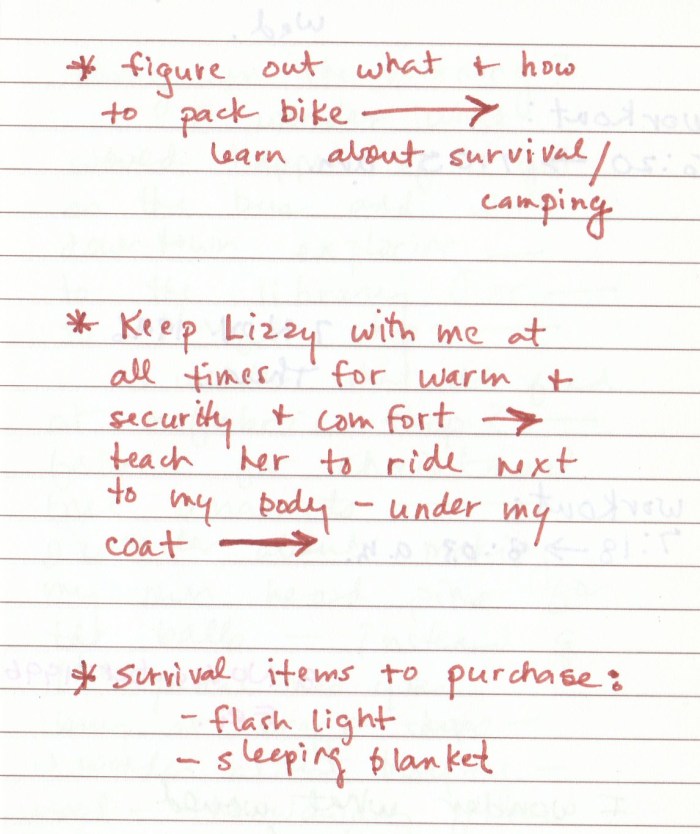As I said last week, having never been homeless, I’ve been luckier than many with mental illness. For, indeed, some estimate that as many as 50% of the homeless in America suffer from some form of serious psychiatric illness.
When I wrote this just 8 days ago, I had not yet come across journaling I did in 1996 about my own fear of homelessness. In fact, I had forgotten about this completely until I discovered the following yesterday morning:
I continued this discussion the following day, listing items I thought I could sell to prevent homelessness, as well as plans I hoped to have in place in the event that I did lose my housing. (Note: “Lizzy” was my Maltese at the time.)
At the time I wrote this, I was in the middle of my first review of benefits from Social Security Disability—something I now know happens regularly. However, I’m appalled that I thought the threat of homelessness serious enough to warrant writing about it, let alone planning how I would manage were it to become a reality.
And, to be honest, I’m horrified that I somehow considered this analysis, though dark, also evidence of hope. If I believed that gray was ” the color of hope,” and if I considered this writing hopeful, I hate to imagine what I might have written in a state of true despair.
Or was I just that out of touch with reality?
























This is just heart wrenching Kathy…
LikeLike
I know. It’s extremely painful for me, as well. Actually, it nearly terrifies me. Thanks for reading, Emily!
LikeLike
Oh Kathy, this is so painful to read. But the very fact that you made a list tells me that you weren’t out of touch. The list, as terrible as it is, shows that you were being responsible for your own life. And therein lies the hope.
LikeLike
I don’t know. If I understand correctly, I had a therapy session the same day I started this list. I will have to go back and watch it, to see if I was literally out of touch. But, yes, the ability to plan does suggest some hope. Good point. Thanks, Renee!
LikeLike
I do see hope though, in a strange way. Hopelessness to me includes an inability to plan. The world comes crashing down, and you don’t know what to do, so you do nothing. You had a plan that included survival and companionship. To me that is a sign of hope.
LikeLike
I don’t know, Lisa! You are correct that really deep depression creates a form of paralysis that precludes planning. But I’m not sure I was as depressed here, as I was psychotic. Like I said to Renee, I think there may be a video taped therapy session from one of these two days. I will need to watch it, if I can find it. This will tell me more. Thanks for reading, Lisa. Hope today is brighter for you, my friend!
LikeLike
You give me courage in my own troubles, Kathy, which so far have not quite hit that level, although it is conceivable to me that they could, which is scary, although I think we have a bigger support network than it sounds as though you had at the time.
LikeLike
Yes, you’re right. My support system was limited. It’s good to know you have freinds and/or family who won’t let this happen to you.
LikeLike
I see hope and strength in this, hidden under the pain. I agree with the other comments that the ability to plan is a hopeful sign. It’s a way of bringing order into an otherwise chaotic world. Maybe in your psychosis, that’s what you were trying to do — plan for the worst as a way to establish order and normalcy. I admire your courage.
Oddly, I can see gray as a color of hope. If the world is viewed as black or white, bad or good, then gray would be a bridge between the two.
LikeLike
Yes, I imagine that’s what I was thinking about the color gray–that it’s an effort to back up out of complete darkness. I think it was a hopeful sign that I was able to plan. You’re right, Hilary.
LikeLike
This is chilling, Kathy…I’m so sorry you even had to think about this stuff!
Hugs,
Wendy
LikeLike
I know. It’s incredibly scarey. It’s sad to think of myself as being that scared and alone.
LikeLike
I also think that ability to plan was a strong sign of hope….each of these post provides amazing insight…again thank you.
LikeLike
You’re so welcome, Charles! Thanks for reading, my friend!
LikeLike
Amazing that you wrote about this incredibly difficult time of your life and had the presence of mind to keep these journals. Heart wrenching that you went through this.
It breaks my heart that there is no safety net (or at least one that is big enough) for so many people – like you, during this time.
I see the color of hope in how you overcame this. Are you so proud of yourself for doing so, or terrified of falling again?
LikeLike
Really interesting question, Deanna. I guess I’m both proud and afraid it could happen again.–especially if anything were to happen to Sara. I imagine that would shake me profoundly! But, yes, thank God I kept the journals!
LikeLike
Having read your post about your shopping lists during that same period, I don’t think you were being unrealistic in fearing homelessness… Losing your housing was a very real possibility to you at the time. Your journal entries show that you weren’t lying to yourself about the situation and showed a lot of strength.
Looking at these journal entries made me think about some of the silly school assignments we had to do as kids – “what three items would you take with you if your house was burning down and why?” etc etc. But then I got the chills, because your list was real.
As always, thanks for sharing this with us. It can’t be easy for you to re-confront all of these issues, but I suppose it’s an important part of the healing process.
LikeLike
What an interesting insight, Gemma! I had forgotten about those kinds of silly questions. But I guess this was the very real terror that I faced. When you put it that way, it makes me somehow see this as even more terrifying, as it should have been. Thanks for this great awareness!
LikeLike
Just saw this and thought I’d share it with you!
http://dailypost.wordpress.com/2011/05/19/if-your-house-were-on-fire-what-would-you-grab-first/
LikeLike
How interesting, Gemma! Thanks for pointing me here! Hope you have a lovely evening———————
LikeLike
Kathy, your plans strike me because in a lot of ways I do the same thing everyday. I think we plan, prepare, and list to feel like there is calm and control amidst the uncontrollably chaos. Mapping out backup plans for homelessness seems so strangely similar to my plotting and planning ways to lose weight, to keep the house clean, to save money for baby’s college. I think at the core of it is just the human want to have a say in how things play out.
LikeLike
Exactly, Tori! It is human nature to want to control their destiny, which I guess was all I was trying to do–just a very extreme form of helplessness and vulnerability, I guess. Thanks!
LikeLike
Wow, I don’t even know what to say to this. But thanks so much for sharing.
LikeLike
I know, Heather, it can leave you speechless. What can one really say, when you get right down to it. I can imagine how you feel!
LikeLike
Kathy–
I don’t know why this reminds me of the book “The Road” by Cormac McCarthy–have you read it?
I found that book to be, from start to finish…HOPEFUL…(everyone disagreed with me, thought I was crazy) because they were always moving toward the next thing and the next thing—through all that gray, no less–toward something they believed in…
so…when we strive to find ways to continue living…THAT is hope.
sad and heart-wrenching as those notes are…they speak of the will to live.
blessings and love
jane
LikeLike
Yes, yes, yes! That is hope. The willingness to keep on living regardless of the darkness. Perhaps that’s what allows black to spill over into gray–an ever so slightly brighter color! Thank you, Jane! You always, always, always help me see a bit more clearly. I can’t thank you enough for that, dear friend!
LikeLike
Planning ahead is always a wise move. I can totally relate on the SSDI issue. A year and a half ago, they sent me to a Doc….who had never seen me….after my being disabled for 11 years…..and this guy did a 10 minute exam, with no neuro tests whatsoever, did not even look at my legs, and then….BOOM!….a month later I get a notice from SS that my benefits are being stopped because “I HAVE IMPROVED” enough to return to work. (After 11 years) I about had a cow! I got a Lawyer and I went to three different specialists, two of whom did not know me, and all three sent in long detailed reports about how I was PERMANENTLY disabled. I was waiting for my appeal hearing date and then got a letter from SS a month later basically saying…”Never mind…our mistake…you are still disabled….” But, by then my benefits had already been stopped and it took them 3 months to resume them. Your idea of having a plan on what to do is a great idea!
LikeLike
Gosh, Mark, what a nightmare! What an incredible nightmare! SSDI is tricky. Especially once you decide to go back to work, which is what I did a few years ago. Wow, I’m sorry to hear you went through that!
LikeLike
The red color signifies extreme emotions, just like gray signifies hope.
May be you were driven by them as you began writing in red, xoxo
LikeLike
Maybe I was! You’re right. Red does ususally suggest strong emotion. Thanks for mentioning that. I appreicate you taking the time to read and comment. And hope you’ll come back again soon!
LikeLike
Once again, I’m amazed at how much you’ve kept in terms of journals, notes, lists, drawings, and such. What a wealth of resources to draw on for your memoirs!
I would probably have been too afraid to write down a “Homelessness Contingency Plan” of my own, for fear of manifesting homelessness through the simple act of committing it to paper! In ink!! (I am a bit superstitious that way– I never even liked to write the word “crazy” down in case it would make me become “crazy”!)
LikeLike
I know, Dana. I’m so greatful now that I kept these things. Mostly they were all in my journals, so I’m glad now that I wrote so many kinds of things in these notebooks. (I understand what you mean about not wanting to write things down lest they become true.) Have a great weekend, dear Dana!
LikeLike
If gray is the color of hope, forget Plano – Portland is the place to be. You’d have been absolutely brimming with happy anticipation all winter long.
LikeLike
You make me laugh, Mark! Are you trying to suggest Portland is gray all winter!!!!!!!! Noooooooooooooo
LikeLike
Wow. Your notes remind me so much of the “journal” my Friend kept during her struggle. While I was reading her notes, many times I thought, “why in the world was she worried about ______?” You are shedding so much light on this disease for me. Thank you!
LikeLike
Gosh, I’m so glad to think that this could be clarifying for you in that regard! How wonderful! That makes me believe more than ever in the message I have to deliver.
LikeLike
I agree with so many commenters who have applauded your resilience and fortitude in being able to come up with a plan of some sort even when you were at such a low point. I do think making lists is a good way of working toward control of an untenable situation, and your inclusion of your dog in your list shows a lot of self-knowledge and compassion as well. I have a sister who is deeply mentally ill, but she is completely unwilling to acknowledge it or get any help at all. If the unexamined life is not worth living, then surely yours is most worthwhile.
LikeLike
I’m really sorry to hear about your sister. That has got to be painful! But I agree, my examined life is worthwile, indeed. At least it feels that way! Take care and have a great weekend———————- Thanks for sharing!
LikeLike
I *so* get this. It’s a stripping down to the survival level and, being intelligent women, we figure it out. It’s shocking to look at these lists after the fact to see just how objective we can be with disaster.
LikeLike
Isn’t that the truth, Sandy! It’s bizzarre how objective we can be in the face of disaster. I guess it’s a matter of survival. I’m sorry you had similar fears, concerns, etc. But it’s good to know I’m not the only one, as well, I guess!
LikeLike
Having the foresight to make a plan seems quite the opposite of being out of touch with reality. Seems to me that even as you realized your illness was progressing, you were making sure to take care of yourself. What a scary time that must have been.
LikeLike
I understand what you’re saying. I guess I mean out of touch with reality in thinking homelesness was a real likelihood! As I look back on it, I think I over-reacted–though, of course hindsight is always 20/20.
LikeLike